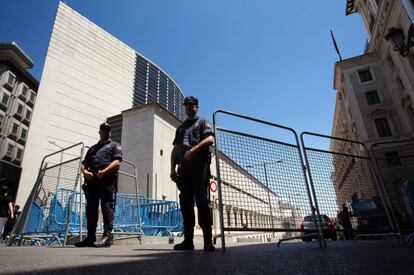Police keep people's house of laws barricaded from its own citizens
Government fears dark images of officers charging at protestors rushing Congress

It was nothing more but another surprise.
On July 11, Prime Minister Mariano Rajoy stood up in Congress and announced drastic cuts for government workers and an unprecedented hike in the standard value-added tax rate, from 18 percent to 21 percent. Two hours later, as the debate continued, some 200 government employees gathered outside of Congress. Immediately, a noticeable police presence, with some officers on horseback, appeared on the scene. The following day, an operation unfolded to block access to pedestrians and traffic - anyone, who wants to enter the building on Carrera de San Jerónimo has to identify themselves, including lawmakers.
Since July 16, security officers have put up dense mesh fencing around Congress. There has been anger, but also consternation, among some lawmakers who feel isolated from what is occurring to ordinary people.
It is a fact that protestors from various groups felt the need after Rajoy announced his austerity measures to establish a presence outside the chamber's doors. And they tried to do so until last Thursday, when the deputies approved the cuts.
The days have passed and the shield has not come down. Cayo Lara, national coordinator for the United Left (IU), and Socialist Party spokeswoman Soraya Rodriguez both sent letters to Congress speaker Jesús Posada asking for "more flexibility" in the police blockade. The rest of the parties' spokespersons have also expressed their concern on the chamber floor, asking the authorities not to turn Congress into "a bunker."
Police are concerned that "normal" people have become more aggressive
Even the PP spokesman, Alfonso Alonso, admitted that he was uncomfortable about the situation, but said that the final decision rests with the security forces. Government sources acknowledge that the goal is to prevent at all cost possible police charges against demonstrators in front of Congress or nearby, as has taken place outside the Greek parliament. Such images would be broadcast around the world on television.
"We do not have to protect ourselves from the public and there is nothing to fear from citizens; instead we must protect ourselves from speculators and those who rob us of our dignity and sovereignty," Lara thundered from the podium last week.
"Our intention is to remove the barriers in the coming days," said one government source, "but it has been necessary to adopt these measures because there are anti-establishment groups fixated with the idea of 'Everyone to Congress!' and we cannot let this happen." While the risk is there, the barrier will remain.
Some groups have been toying with the thought of attempting to break into and take over Congress for more than a year now but it has been brewing even more so "in recent months because there are some who are feeling increasing hatred toward politicians because of the cuts," said a police official.
On the social networks, there are more messages that are being circulated encouraging people to break into Congress to make people around the world aware of the situation. Having taken the temperature of protestors in recent protests, police are now concerned that "normal people have become more aggressive and curiously drawn to the riots by the anti-establishment."
The perimeter fences remain closed from the Palace Hotel to Cedaceros street, and also Zorrilla street (at the back of the old building). That has meant that "at times" no one can enter or leave the public parking located on Las Cortes square as one employee complained
Tu suscripción se está usando en otro dispositivo
¿Quieres añadir otro usuario a tu suscripción?
Si continúas leyendo en este dispositivo, no se podrá leer en el otro.
FlechaTu suscripción se está usando en otro dispositivo y solo puedes acceder a EL PAÍS desde un dispositivo a la vez.
Si quieres compartir tu cuenta, cambia tu suscripción a la modalidad Premium, así podrás añadir otro usuario. Cada uno accederá con su propia cuenta de email, lo que os permitirá personalizar vuestra experiencia en EL PAÍS.
¿Tienes una suscripción de empresa? Accede aquí para contratar más cuentas.
En el caso de no saber quién está usando tu cuenta, te recomendamos cambiar tu contraseña aquí.
Si decides continuar compartiendo tu cuenta, este mensaje se mostrará en tu dispositivo y en el de la otra persona que está usando tu cuenta de forma indefinida, afectando a tu experiencia de lectura. Puedes consultar aquí los términos y condiciones de la suscripción digital.








































